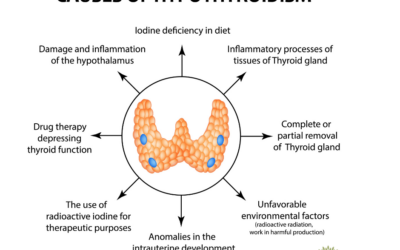I get asked all the time if there are certain foods that someone should or should not be eating if they have a Thyroid problem. It makes me absolutely crazy when someone has been diagnosed with a thyroid problem and been told by their Primary Care doctor or Endocrinologist that there is no need to change their diet, it won’t make any difference. I completely disagree with that. I will tell you why and what I have found on the diet side of things that definitely will make a difference.
The first thing and the most important, in my opinion, is to go gluten free. Why is that so important? Because, there is a protein in gluten, gliadin to be exact, that is very damaging to the Thyroid. If you understand that, in 90% of Hypothyroid cases, autoimmunity is to blame, then we know that most people with Hashimoto’s (the Autoimmune condition that causes hypothyroidism) have an immune issue. Their immune systems have been overactivated and are now breaking down their own bodies. Specifically, their Thyroid gland. There is a demonstrated link between antibodies to the Thyroid and antibodies to the gliadin protein found in wheat (1) Gliadin looks similar to thyroid tissue, so once an autoimmune process begins, you start to see breakdown in whichever organ system is affected.
There was a large study done on over 2000 patients with Hashimoto’s hypothyroid disorder, a whopping 88% of them felt better by completely eliminating gluten from their diets. In contrast, on 43% of them felt better on the most commonly prescribed medication for hypothyroidism, a synthetic T4 Thyroid hormone. (2). This is unbelievable to me. Giving up wheat products can be tough, but the results are nothing short of spectacular.
So, do you have to give up all gluten. The answer is yes. You may want to do it slowly and reduce it gradually, but true healing of the gut begins when you completely eliminate gluten. It’s been my clinical experience that it takes most people about 3 months completely off gluten to really see the max benefit. There is some improvement before that, but I think it helps to realize that just avoiding gluten for a week won’t produce max benefit. If I don’t tell you that, you may think “It’s not working” after a few weeks and give up right before you are about to see major benefits.
Let’s talk about another group of foods that also can be a problem for those with a compromised Thyroid. That is dairy products. I find that many of the clients I work with do not tolerate dairy very well. Dairy products can contribute to inflammation of the digestive tract and a condition know as “Leaky gut”. This contributes to the autoimmune problem, which in this case, is breaking down the Thyroid gland. (3) Some people feel bloated, gassy and experience digestive issues with dairy. Others do not. A digestive test like the GI map that looks at markers for leaky gut and inflammation and/or a food sensitivity test can be very helpful to help figure this out for each individual.
Of course, since we are all different, the foods that are healing for one person may cause an issue in another individual. If I work with someone and they eliminate wheat and dairy and still don’t see the progress they are looking for, I will recommend the food sensitivity testing I mentioned above. This gets you a blueprint for your own body specifically. Armed with a list of reactive foods, you can remove foods that are damaging your gut and contributing to autoimmunity.
I hope you have found this information helpful. Diet really is a big player in overall health. By avoiding gluten and dairy and focusing on whole, unprocessed healthy foods like non-starchy vegetables, fruits in reasonable amounts, healthy fats and proteins, it really can make a drastic improvement in your health.
If you would like to talk about your specific situation to see if I can help you with your Thyroid problems, you can use this link to schedule a free consultation so we can talk.
To your health,
Dr. Jeni
- https://pubmed.ncbi.nlm.nih.gov/15244201/
- https://thyroidpharmacist.com/articles/gluten-root-cause-thyroid-condition/
- https://pubmed.ncbi.nlm.nih.gov/22109896/


